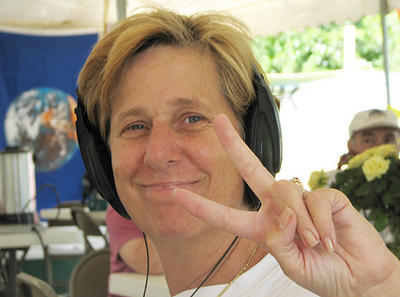
George Lakoff and Aldo Vidali

Filming Starts On ‘Deflating The Elephant’
By W. Leon Smith
ICONOCLAST EDITOR-IN-CHIEF
CRAWFORD — Italian documentary film director Aldo Vidali has undertaken the creation of a new film, Deflating the Elephant, which is based on the George Lakoff bestseller “Don’t Think Of An Elephant.”
In an interview with Lone Star Iconoclast publisher W. Leon Smith, Vidali explained the importance of utilizing “frames” to enhance debate. He also discussed how conservatives are using frames to negatively sway public opinion, which will be demonstrated in the new film.
Vidali, who is also a boat builder, publisher, world traveler, linguist, political and environmental activist, father, and eclectic writer, plans to style his film in the tradition of the famed Italian director, the late Frederico Fellini, with whom he was associated for many years.
Currently, Vidali teaches at the Fellini-Antonioni Acting Studio in Northern California, where he trains aspiring actors and actresses in the “Fellini Way.”
Vidali was born in Ixelles, Belgium, and was educated in Rome, Italy.
He and his family joined the Resistance Movement against fascist and Nazi forces during World War II. When he was only 13 years old, he was captured by the Nazis during the Fosse Ardeatine Nazi dragnet in Rome, but was released shortly thereafter because of his age. At the time, his family members were sheltering several Jewish refugees in their apartment to prevent their deportation to death camps in Germany.
At the age of 18 (1949) Vidali explored the tropical wilderness of the Brazilian interior selling Coleman lamps and stoves to primitive villages as a way to earn college tuition.
He came to the United States to study geology at the Colorado School of Mines in 1950. During the early 50s, Vidali prospected in the Mexican states of Sonora and Durango. After selling his interest in his Mexican mineral discoveries (Plomo Y Plata de Mexico and Exona) to ALCOA, he returned to Europe to do documentary film work.
It was here that he collaborated with director Fellini on a project entitled The Strange Voyage of Mr. Mastorna and learned directing and cinema acting during the Fellini creations of 8-1/2 and Boccaccio 70. He had a brief professional relationship with Luchino Visconti. Vidali also dealt with government and entertainment industry VIPs such as President Johnson, Jack Valenti, John Mecum, and Peter Sellers
His documentary works originated a new genre, superimposing fiction on real-life documentary backgrounds. Straw Hat and the Crown, shown on the Italian R.A.I. Television Network, received recognition even from the Vatican for its subtle moral theme set off by contrasting a fairy tale on a background of real life events.
In 1963, Vidali went to Africa as Second Unit Director of the feature documentary Good-bye Africa, a Rizzoli Production. He covered South Africa, Southwest Africa, Mozambique, Kenya, Zanzibar, Congo, and Angola. This exposed him to a wide range of human beings, both as a film director as well as the liaison officer between the South African government and the Italian film unit.
Back in the U.S. in 1965, Aldo wrote and directed Sunset at Dawn, a predictive environmental film essay on the worsening ecological crisis, followed by Trail to the Stars, a film view of the NASA space program contrasted with America’s pioneering past. These were followed by a series of minor commercial works.
In 1978, Vidali participated in the environmental-political campaign in Kauai, Hawaii, to save the island’s pristine shorelines at Nukoli’i from yet another tourist development.
A champion of the environment, Vidali later challenged Republican Interior Secretary James Watt, when Watt opened vast sections of Federal lands to exploitation. Vidali developed a plan to preserve the wilderness by rushing to the Denali region of Alaska, forming the Alaska Capital Corporation (ALCOR), and leasing thousands of acres of federal oil lands.
Explained Vidali, “The Watt Administration had assumed that small entrepreneurs could not afford to drill in the Arctic, thus leaving the course clear for major players. ALCOR deliberately proceeded to subdivide the leases into impractical 40-acre parcels, which would oblige major oil companies to buy out each and every one from far too many owners before they could move in and drill. One single holdout lease could stall exploration for years.”
Vidali hired and trained agents to successfully distribute tiny oil lease parcels across the nation. This maneuver caught the oil industry by surprise, and by the time they pressed the government to impose a minimum parcel size of 2,500 acres, it was too late. Big Oil tried to make the law retroactive. Vidali blocked that illegal attempt by notifying all leaseholders to demand their rights against this undemocratic scheme of Big Oil. This tactic was successful, and thus prevented major exploitation of the Denali for 10 years.
Vidali returned to the mainland in late 2000 where his family created a film with students under the UNECO label entitled Life & Liberty in the Balance, protesting the illegitimate court appointed Bush administration. Vidali is currently in pre-production of a full feature documentary: Toward a Global Open Society, a dialogue between great contemporary minds and the American people. This film addresses the urgent need of all citizens to participate directly in dialogue and action to restore their Constitutional Republic.
Reviving the motion picture work developed under Fellini’s guidance, Vidali is now teaching and preparing productions dedicated to promoting the restoration of American Democracy, defense of the Bill of Rights, and openly denouncing the neo-fascist “Patriot” Act and the neo-con imperialistic scheme against America.
Vidali currently lives with his wife and two sons on California’s Central Coast. He volunteers as Chairman of UNECO, a nonprofit environmental and humanitarian corporation, and is active in the United Defenders of Liberty Movement.
He speaks English, Italian, Spanish, French, and Portuguese, and is a public lecturer on social, educational, and environmental subjects.
The interview:
ICONOCLAST — Who is producing the film, “Deflating The Elephant?”
VIDALI — UNECO, which is a non-profit 501(c)3 organization, in collaboration with a number of other organizations which will be listed on the website that I sent you.
ICONOCLAST — Are you the director?
VIDALI — I’m going to be the film director, yes.
ICONOCLAST — Where will this be shot?
VIDALI — It’s going to be shot in various places. Some of it will be illustrated with footage from a long history of motion pictures. There are many, many examples of framing that we will take right out of the history of film. Some of it will be filmed in Los Angeles, some of it, possibly, in Texas. Maybe we can film some of it in Crawford.
ICONOCLAST — In what format do you intend releasing this film?
VIDALI — There’s going to be two parts of the film. The first part will be what we call streaming on demand on the internet. That first part will really be a course in what framing is all about, a preparation for the general public. We can then go into the theatres to look at the main body of the film, which will be “Deflating The Elephant,” and it will be a full illustration of the George Lakoff art of framing.
ICONOCLAST — Will the film be released to movie theatres?
VIDALI — Yes. The main body of the film will be released to them. In other words, we sort of want to do a plowing of the ground by putting it on the internet and through DVDs, a sort of Framing 101, teaching people what framing is all about, what is this framing, so that they begin to get curious as to, yeah, we’d like to invent frames, we’d like to develop frames and respond to the political assault on our country the Republicans have put on for 30 years.
The Republican think-tanks have spent $3 billion to scheme up deceiving mental frames and essentially they are stealing our country from under our feet without realizing what is going on. So realizing that they took 30 years to do this and $3 billion in controlling the mass media, the question is that we are presenting to the public is “can this kind of a vast castle of corruption be removed from the American landscape in less than a year.” We say, “yes” for a very simple reason. Everybody knows that a demolition is always a hundred times faster and cheaper than construction. Essentially, conservative mental frames that oppress the American people can be brought down very fast by controlled demolitions through a very powerful message. The reason we are using Fellini is because he was a very successful in destroying the fascist, extreme right-wing mentality in Italy with films that just blew people’s minds. In fact, his name is become part of the language in many countries in the world, even in American we use the term Felliniesque.
ICONOCLAST — Is George Lakoff participating in this in any way?
VIDALI — Yes.On the website that I’ve sent you, you will be able to see three minutes of the Lakoff interview and explanations about framing and what they have done to us. We have already over seven hours of filming of Lakoff.
ICONOCLAST — You were involved in the resistance movement against the fascist and Nazi forces in World War II?
VIDALI — Oh, yes. In fact I was involved in sheltering Jewish refugees in our own apartment in Rome. We had a very hard time.
ICONOCLAST — Did you perceive, looking back on it now with Lakoff’s definitions of framing...was that being done then?
VIDALI — Well, yes. You see, the Republicans have become experts in negative and false frames. The fascists and the Nazis were great framers of psuedo-patriotic crap that the German people started goose-stepping behind. Today, for example, in Crawford, Texas, George W. Bush has put on his latest deception frame by saying “a noble cause” which to the world looks like a piece of cow dung hiding behind a Bush shade from the hot Crawford sun.
ICONOCLAST — Do you think that Bush is utilizing Orwellian terms?
VIDALI — Oh, absolutely. He is utilizing them constantly, repeatedly.
ICONOCLAST — Like “Patriot Act?”
VIDALI — The Patriot Act is definitely an Orwellian frame. It should be called The Traitors’ Act because it destroys the very foundation of America’s freedom which is our Bill of Rights.
ICONOCLAST — Do you have a release date for this film? Do you know when it will be completed?
VIDALI — Our desperate hope is to do two things. One is to complete the filming and hopefully have a releases before the 2006 election. It is a very ambitious goal, but I think there are enough forces in the United States that see the catastrophic danger facing us. And we are doing it non-profit so that we can allow any organization that wants to help to jump in and say, “We want to help distribute this, we want to help make it, we want to help by creating new frames for the American public.” Half of the public has been really defrauded by this dirty game that the Republican think-tanks have been carrying on for a long time now. So we need to get everybody into the act of coming up with ideas and to please start reviewing all the false frames and see how we can break them down.
ICONOCLAST — Are you talking about a world think-tank?
VIDALI — Instead of the think-tanks for the American left orthe American progressives, I see more like language guilds of both students and professors and ordinary people who say, “We want to restore our language. We’re tired of this double-talk, this Orwellian as you justly called it, this Orwellian confusion that they are putting people in, which includes what the Christian right is doing, what people like Robertson are doing, talking about “thou shalt not kill” and then he calls for assassinations. I mean, we’re in a madhouse and we’ve got to restore some kind of sanity.
ICONOCLAST — So the place to start might be with the word “conservative?”
VIDALI — Oh, absolutely. That could be a great start because they aren’t conserving anything except their pocketbooks.
ICONOCLAST — Have you done the casting for the film?
VIDALI — I can’t disclose that yet, but we are in discussions with some top actors.
One thing that I wanted to mention, we were talking about the frames that have saved our country. Roosevelt had the greatest of frames that we need again: “The only thing we have to fear, is fear itself.” That was Roosevelt. The great frame from John F. Kennedy was, “Ask not what your country can do for you, ask what you can do for your country.” That’s what we need to return to.
ICONOCLAST — It appears that the Bush administration has taken an opposite approach to the Roosevelt administration by embracing fear as a positive.
VIDALI — Absolutely. They thrive on fear like Hitler did.
ICONOCLAST — Is that what Hitler did?
VIDALI — Adolph Hitler arranged for the destruction of the Reichstag and then said to everyone the sabateurists were everywhere so they took away the civil rights of the German people and they started arresting everybody. We are not yet at that point, but we’re getting close to it. I mean, here was a country that was admired for being at the apex of civilization and we’re now opening up torture chambers around the world. I mean, this is insanity, pure and simple.
ICONOCLAST — Do you draw a lot of parallels to what’s happening today to what happened back when you were about 13 years old?
VIDALI — When I was a child 13, I was grabbed by the Germans and saved by an incredible event. My young, little cousin came and begged the German soldiers to let me go because I was 13. I was saved from that. But we are faced with people who have cruelty in their minds. We are committing crimes all over the place. We have a criminal situation going on.
ICONOCLAST — You worked with Fellini on a couple of pictures?
VIDALI — I was a partner in a company with Michelangelo Antonioni who was the other great Italian director. Through that company, I became acquainted with Frederico Fellini and then we began to work on a script which I’m just getting a copy of, finally, from Italy titled “The Strange Voyage of Mr. Mastorna,” his final grand work. It had do with a voyage to the other world, what happens after death. Of course, he spent half of his life going from one film to another, then back to the idea of making “Mastorna.” The set that was built for “8½” was essentially a desire that he had planned for “Mastorna” because he was going to build this gigantic cathedral. But with “Mastorna,” he died before he was able to do it.
You know, you have a guy in Texas in Fort Worth who has the biggest Fellini collection in the world. He’s trying to gather together all the Fellini films and give a great Fellini festival there. I can send you an e-mail with his name. He has an enormous collection, 5,000 rare posters, books, magazines, music, everything. He knows more about Fellini than I do.
ICONOCLAST — And you were with him. How do you describe the works of Fellini?
VIDALI — Well, Fellini was a man whose probably greatest merit was his uncompromising honesty and sincerity, so much so that he worked on the basis of fantasy, too. He said, “I am a born liar because I have created worlds that are just hopes, that are just dreams, that do not exist yet.” He always used clowns as his symbol because a clown is an attempt at waking up human consciousness at the human madness. He sort of, through his grotesqueness and his exaggeration, tried wake up people to the madness that we have, like when he showed a parade of costumes with the Catholic church. He blew people’s minds because he showed the silliness and vanity of the excessive vestments of the church when there was such poverty all over post-war Italy.
ICONOCLAST — How would you compare Fellini to any particular American director, or would there be any here who would be comparable as to the type of film that he produced?
VIDALI — You see, the thing about Fellini, about comparing him, is difficult, and the reason he became that famous is because he violated all of the — in fact, on the poster on “La Dolce Vita” there is a conversation there where they say, “What kind of a film are we doing.”
He says, “I don’t know.”
“What’s the dialogue going to be all about?”
“I don’t know. I will just be writing the dialogue as I shoot.”
So you’ve got a man who was unique in the sense that he was a full film author. He did everything, from designing the sets to hanging the lights and making sure the camera was in the right position, training the actors, designing the costumes, and so on. So people say he was a film author rather than a director because he did everything.
Now, in America and in all the other countries, usually the director is sort of strapped tight to production by costs, by requirements, and so on and so forth.
He refused to do films unless he had total control, of everything. It was amazing that he was able to get it, but he did. So it’s hard to compare him. There are some very great American directors. You can take your pick, like John Ford and others.
ICONOCLAST — On what types of films do you prefer to work?
VIDALI — I have worked more on documentaries than on actual feature films, because that was my interest.
My interest was political and historical.
I did a kind of a mixed film called “The Straw Hat and the Crown,” which had both a fairy tale on the front and a real event in the background.





 THE AMERICAN FLAG stood approximately 70 ft. tall at the pro-Bush rally held near Pirate Field Saturday afternoon.
THE AMERICAN FLAG stood approximately 70 ft. tall at the pro-Bush rally held near Pirate Field Saturday afternoon. CINDY SHEEHAN addressed thousands at the big pavilion located at Camp Casey II on Saturday.
CINDY SHEEHAN addressed thousands at the big pavilion located at Camp Casey II on Saturday. CROSSES ON THE LEFT, BUSH ON THE RIGHT. The road leading to Camp Casey I and Camp Reality was lined with crosses on the left and Bush posters on the right.
CROSSES ON THE LEFT, BUSH ON THE RIGHT. The road leading to Camp Casey I and Camp Reality was lined with crosses on the left and Bush posters on the right. CARNIVAL ATMOSPHERE — A refreshment stand stood colorful at Camp Reality Saturday.
CARNIVAL ATMOSPHERE — A refreshment stand stood colorful at Camp Reality Saturday. THE PRO-BUSH RALLY was filled with thousands of participants Saturday afternoon.
THE PRO-BUSH RALLY was filled with thousands of participants Saturday afternoon. A DOWNTOWN Crawford traffic jam was caused by thousands of demonstrators coming to the 700 population city.
A DOWNTOWN Crawford traffic jam was caused by thousands of demonstrators coming to the 700 population city. MOVE AMERICA FORWARD sponsored the rally. Here, Howard Kaloogian, founder of Move America Forward, speaksto an enthusiastic crowd of pro-war activists.
MOVE AMERICA FORWARD sponsored the rally. Here, Howard Kaloogian, founder of Move America Forward, speaksto an enthusiastic crowd of pro-war activists. THE STREETS of Crawford was filled with pedestrians on Saturday.
THE STREETS of Crawford was filled with pedestrians on Saturday. AT CAMP CASEY I, Dennis Kyne leads song and dance.
AT CAMP CASEY I, Dennis Kyne leads song and dance. SEVERAL BUS LOADS of visitors arrived at Camp Casey II throughout the day Saturday.
SEVERAL BUS LOADS of visitors arrived at Camp Casey II throughout the day Saturday.





 President Bush supporters drive past Cindy Sheehan's anti-war camp near President Bush's ranch in Crawford, Texas, Sunday, Aug. 28, 2005
President Bush supporters drive past Cindy Sheehan's anti-war camp near President Bush's ranch in Crawford, Texas, Sunday, Aug. 28, 2005 Cindy Sheehan, left, and Rev. Al Sharpton greet each other after he arrived at Camp Casey 2 near President Bush's ranch in Crawford, Texas, Sunday, Aug. 28, 2005.
Cindy Sheehan, left, and Rev. Al Sharpton greet each other after he arrived at Camp Casey 2 near President Bush's ranch in Crawford, Texas, Sunday, Aug. 28, 2005. A McLennan Sheriff Deputy warns an unidentified Cindy Sheehan supporter that she will be arrested if she does not stay on the Camp Casey 1 side of the road across from the pro-Bush protesters near President Bush's ranch in Crawford, Texas, Saturday, Aug. 27, 2005. Several thousand people descended on President Bush's adopted hometown Saturday, either attending a rally supporting him or arriving for the last leg of an anti-war demonstration near his ranch.
A McLennan Sheriff Deputy warns an unidentified Cindy Sheehan supporter that she will be arrested if she does not stay on the Camp Casey 1 side of the road across from the pro-Bush protesters near President Bush's ranch in Crawford, Texas, Saturday, Aug. 27, 2005. Several thousand people descended on President Bush's adopted hometown Saturday, either attending a rally supporting him or arriving for the last leg of an anti-war demonstration near his ranch.



 Cindy Sheehan places her son Casey's boots in front of a cross in his name at the anti-war protestors newest campsite near President Bush's ranch in Crawford, Texas, Friday, Aug. 26, 2005. Standing at right is campsite volunteer Tiffany Burns of Los Angeles, Calif.
Cindy Sheehan places her son Casey's boots in front of a cross in his name at the anti-war protestors newest campsite near President Bush's ranch in Crawford, Texas, Friday, Aug. 26, 2005. Standing at right is campsite volunteer Tiffany Burns of Los Angeles, Calif.
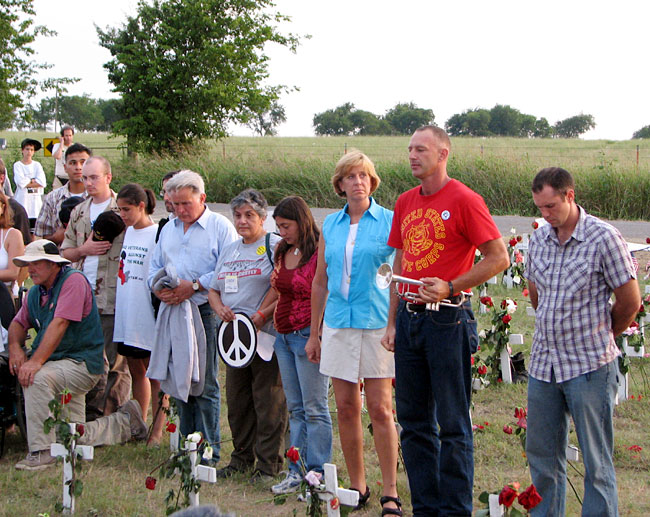
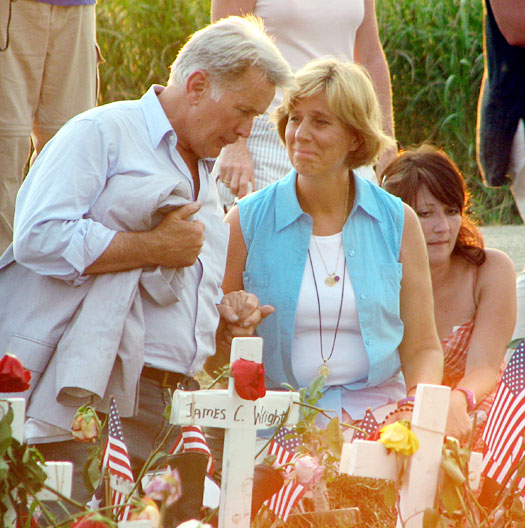

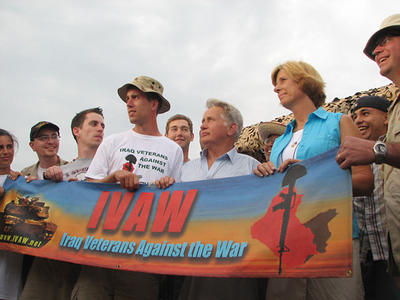

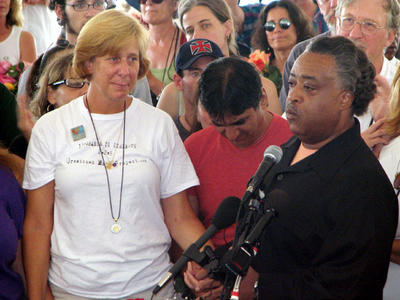 Representatives of a dozen faith-based communities and beliefs gathered this morning for an interfaith prayer service. Each took a moment to express in their own words why this war must end. "We should not declare God to be on our side, but we should be on God's side," said one clergy member. Rev. Al Sharpton closed the service with a moving call to take history into our own hands. Maybe folks didn't have the courage to do what Cindy did, but the least we can do now is stand with her now, he urged.
Representatives of a dozen faith-based communities and beliefs gathered this morning for an interfaith prayer service. Each took a moment to express in their own words why this war must end. "We should not declare God to be on our side, but we should be on God's side," said one clergy member. Rev. Al Sharpton closed the service with a moving call to take history into our own hands. Maybe folks didn't have the courage to do what Cindy did, but the least we can do now is stand with her now, he urged.


